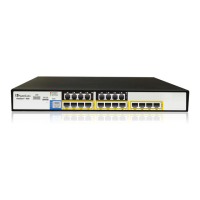IP-to-IP Routing Table Parameters Description
Parameter Description
Matching Characteristics
Source IP Group ID
[IP2IPRouting_SrcIPGro
upID]
CLI: src-ip-group-id
Selects the IP Group from where the IP-to-IP call originated. Typically,
the IP Group of an incoming SIP dialog is determined (or classified)
using the ‘Classification’ table (see Configuring Classification Rules on
page 462). If not used (i.e., any IP Group), simply leave the field empty.
The default is -1.
Source Username Prefix
[IP2IPRouting_SrcUser
namePrefix]
CLI: src-user-name-
prefix
Defines the prefix of the user part of the incoming SIP dialog's source
URI (usually the From URI). You can use special notations for denoting
the prefix. For example, to denote any prefix, use the asterisk (*) symbol;
to denote calls without a user part in the URI, use the $ sign. For
available notations, see 'Dialing Plan Notation for Routing and
Manipulation' on page 753.
The default is * (i.e., any prefix).
Source Host
[IP2IPRouting_SrcHost
]
CLI: src-host
Defines the host part of the incoming SIP dialog's source URI (usually
the From URI). If this rule is not required, leave the field empty. To
denote any host name, use the asterisk (*) symbol (default).
Destination Username
Prefix
[IP2IPRouting_DestUse
rnamePrefix]
CLI: dst-user-name-
prefix
Defines the prefix of the incoming SIP dialog's destination URI (usually
the Request URI) user part. You can use special notations for denoting
the prefix. For example, to denote any prefix, use the asterisk (*) symbol;
to denote calls without a user part in the URI, use the $ sign. For
available notations, see 'Dialing Plan Notation for Routing and
Manipulation' on page 753.
The default is * (i.e., any prefix).
Destination Host
[IP2IPRouting_DestHos
t]
CLI: dst-host
Defines the host part of the incoming SIP dialog’s destination URI
(usually the Request-URI). If this rule is not required, leave the field
empty. The asterisk (*) symbol (default) can be used to denote any
destination host.
Request Type
[IP2IPRouting_Request
Type]
CLI: request-type
Defines the SIP dialog request type of the incoming SIP dialog.
[0] All (default)
[1] INVITE
[2] REGISTER
[3] SUBSCRIBE
[4] INVITE and REGISTER
[5] INVITE and SUBSCRIBE
[6] OPTIONS
Message Condition
[IP2IPRouting_Messag
eCondition]
CLI: message-condition
Selects a Message Condition rule. To configure Message Condition
rules, see 'Configuring Condition Rules' on page 467.
ReRoute IP Group ID
[IP2IPRouting_ReRoute
IPGroupID]
CLI: re-route-ip-group-id
Defines the IP Group that initiated (sent) the SIP redirect response (e.g.,
3xx) or REFER message. This field is typically used for re-routing
requests (e.g., INVITEs) when interworking is required for SIP 3xx
redirect responses or REFER messages (for more information, see
'Interworking SIP 3xx Redirect Responses' on page 442 and
'Interworking SIP REFER Messages' on page 445, respectively). This
parameter functions together with the 'Call Trigger' field (see below).

